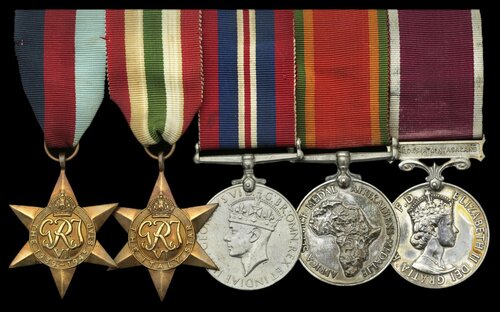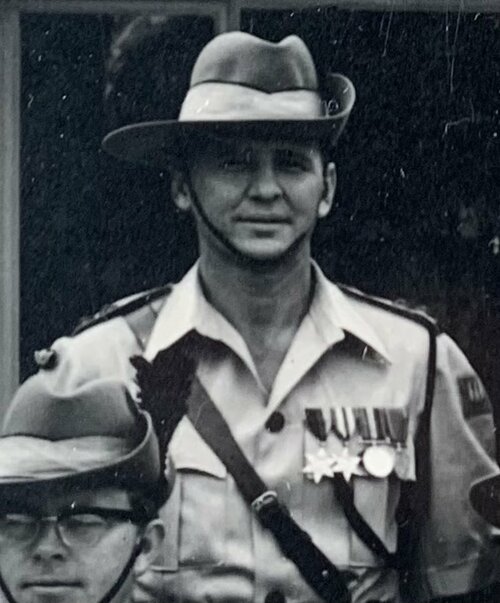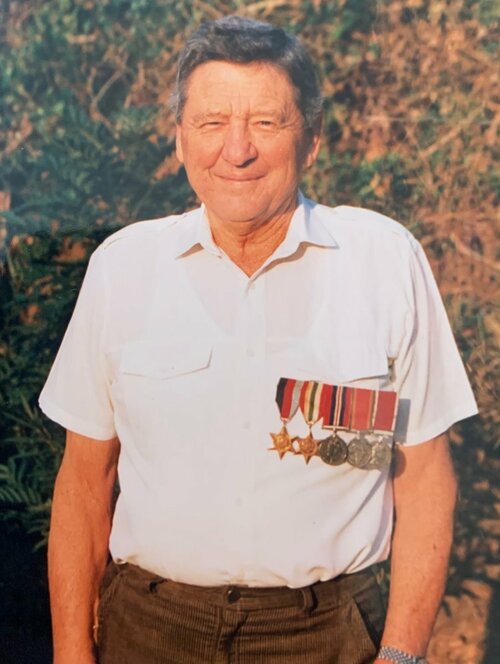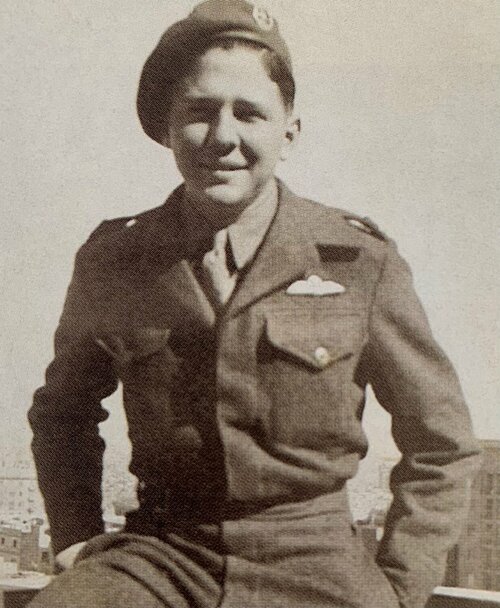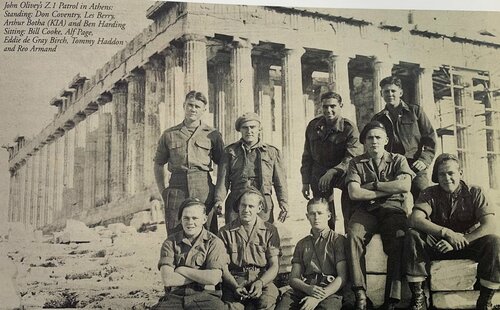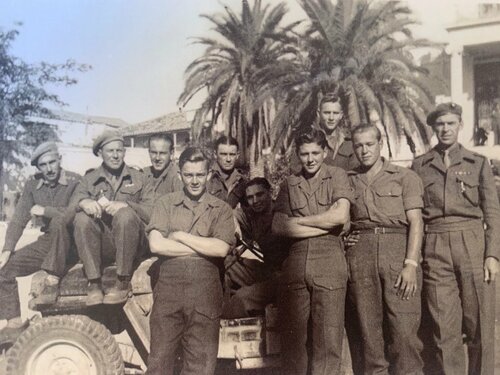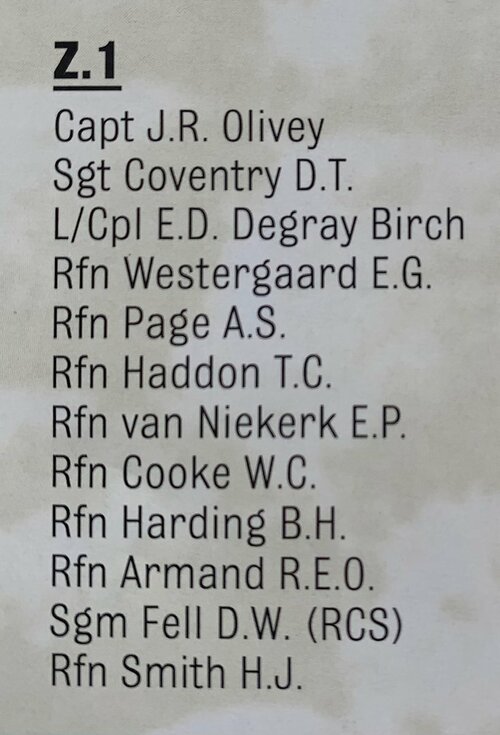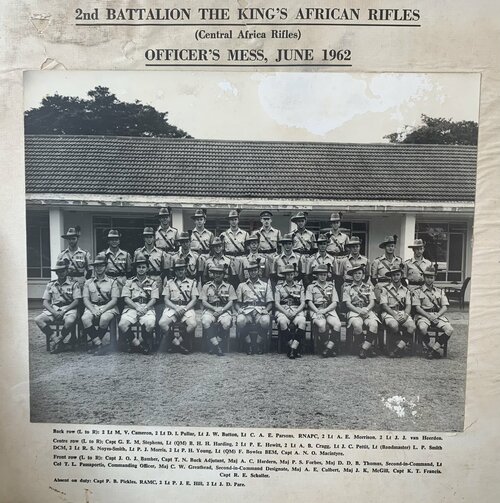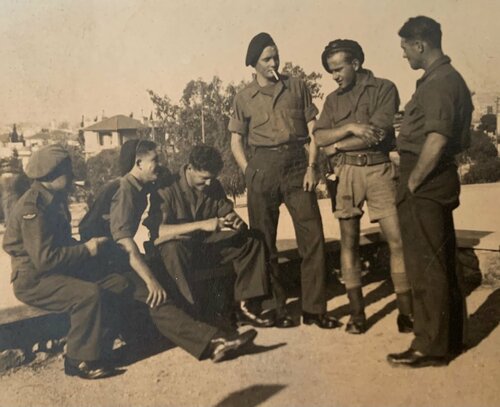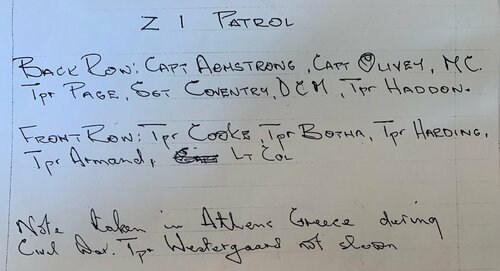Auction: 21002 - Orders, Decorations and Medals
Lot: 141
A rare campaign group of five awarded to Lieutenant B. H. 'Darky' Harding, Southern Rhodesian Forces, who served with the Long Range Desert Group (LRDG) from August 1944 until its disbandment, serving in Captain J. Olivey's eleven-man Z.1. Patrol to great effect in Greece
1939-45 Star; Italy Star; War Medal 1939-45; Africa Service Medal 1939-45 (SR.599042 B. H. Harding.); Army L.S. & G.C., E.II.R., Rhodesia & Nyasaland (0367. Lt. B. H. Harding.), officially engraved naming, mounted as worn, very fine (5)
Barend Hercules Harding - or Darky to his friends and comrades - was born at Bethlehem, Orange Free State on 19 December 1924 and was a clerk by trade. He attested for service in Southern Rhodesia on 26 May 1943 and served with the Rhodesian Recce Unit and the 49th Survey Company. He was posted to join the strength of the British Forces in the Central Mediterranean in July 1944 and joined legendary Long Range Desert Group on 4 August 1944, being a member of the Z1 Patrol.
Harding went into action in September, when it was adjudged that the Peloponnese would be landed upon from the Bay of Athens. The following on the LRDG in the Balkans gives good detail on their actions (https://weaponsandwarfare.com/2020/01/02/lrdg-in-the-balkans/):
loyd Owen was asked to provide an LRDG patrol to act as Bucket Force’s ears and eyes as they advanced east from Araxos, so he called on John Olivey and his Rhodesian Z1 Patrol. Olivey’s 11 jeeps arrived in Greece by landing craft on 26 September, roaring ashore in their jeeps at Katakolon, 40 miles south of Araxos. The patrol soon became bogged down, however, Olivey noting as they drove north that ‘the roads [are] very bad after the recent rain’. Four of the jeeps in the patrol pulled trailers, on each of which was 1,000lb of equipment for Bucket Force, and within a day of landing Olivey began to doubt that all the vehicles would stand the ordeal if the condition of the roads did not improve.
On 30 September Olivey’s patrol arrived at Bucket Force’s Forward HQ, a few miles west of Patras. L Squadron of the SBS were positioned on the high ground overlooking the port, and their commander, Major Ian Patterson, was endeavouring to persuade the garrison of 900 Germans and 1,600 Greeks from a collaborationist security battalion to surrender. During the night of 3/4 October word reached Bucket Force HQ that the Germans had started withdrawing from Patras. At first light a patrol of the SBS, travelling in the LRDG jeeps, raced into the port and discovered that all but a German rearguard had indeed sailed out of Patras, heading east up the Gulf of Corinth towards the Corinth Canal.
The SBS and the LRDG now set off in pursuit of the Germans. In a convoy of jeeps they roared along the headland overlooking the gulf, a captured 75mm German field gun hitched to the back of one of the jeeps. ‘Chased the enemy who were withdrawing by boat,’ wrote Olivey in his log, ‘firing with .5 Browning and 75 mm gun, from positions on the Corinth Road.’
They reached Corinth on 7 October, exchanged desultory fire with the Germans on the other side of the canal and then accepted the surrender of another battalion of Greek collaborators. From Corinth Olivey received instructions to push on to the town of Megara, several miles to the north-east over a mountain road, but to leave two jeeps’ worth of men in Corinth to help in the clearance of German mines. Olivey’s Z1 Patrol reached Megara on 9 October and at dawn the next day assisted an SBS unit to ‘blow the escape road that the enemy were using’. With that done, they set about preparing a landing strip for the arrival of the 4th Independent Parachute Brigade led by Colonel George Jellicoe. They dropped into Megara on 12 October, a day when the wind was particularly stiff. ‘We were rushed to Megara airfield to help by driving alongside the paratroopers on the ground with open chutes, swinging left or right to collapse the chutes, to enable them to get to their feet,’ recalled Tommy Haddon, a Rhodesian trooper in Z1 Patrol. ‘Even so, many parachutes were not collapsing and men were swept onto the rocks along the coast running alongside the airfield.’
The next day, 13 October, Z1 Patrol was among the first Allied troops to enter the Greek capital. ‘We proceeded over the Corinth Canal to Athens in convoys,’ recalled Haddon, ‘all the way being greeted by singing and joyful Greeks, shouting words of welcome.’ Once in Athens, Haddon and Z1 checked into the Grand National Hotel, though it wasn’t for long. They were soon billeted in less salubrious surrounds – the old Ford factory on the main road to Piraeus.
Foxforce was now subsumed into ‘Pompforce’, a 1,000-strong amalgamation of the LRDG, SBS, 4th Independent Parachute Battalion, a unit from the RAF Regiment and a battery of 75mm guns. Commanded by Jellicoe, ‘Pompforce’ drove north towards Larissa, driving past the detritus of a large-scale German retreat. Glimpses of the Germans were rare, and what resistance was encountered was quickly crushed, as at Kozani and Florina.
John Olivey’s patrol ‘proceeded south of Florina and harassed the withdrawing enemy and proceeded to the flat country … firing at a range of 2,000 yards, at the enemy force withdrawing up the Florina–Havrokhoma Road. Florina was occupied/captured at 1600 hours.’ Hours after the capture of Florina, Jellicoe received a signal ‘instructing us not to go into Yugoslavia or Albania, presumably as a result of a pact with the Russians’.
At the end of October Lloyd Owen withdrew most of the LRDG patrols from Albania, leaving behind Eastwood ‘chasing the enemy where he could’. Much of his work was calling up air strikes on retreating Germans, such as the convoy moving south to reinforce the town of Tirana. Having first blown a bridge with his patrol, Eastwood radioed the RAF, who attacked the convoy as it waited for the bridge to be repaired. The convoy of ‘1,500 men, a few tanks, guns, MT and horse-drawn vehicles’ was all but wiped out. Tirana subsequently fell to the partisans on 17 November, and a fortnight later Eastwood’s patrol finally withdrew after four months of superlative work that only a unit with the LRDG’s unique skills could have accomplished. Eastwood had been awarded a Military Cross for leading the raid on the observation post in Orso Bay, and his sergeant, Andy Bennett, was decorated for his work in Albania, the citation for his Military Medal describing his role during a battle with 200 Germans on the Elbasan-Tirana road:
In a battle lasting some hours he showed magnificent courage under extremely heavy fire. He refused to leave his position only a few hundred yards from the road and thus enabled the combined force to compel the enemy to withdraw, leaving behind eighty dead and much valuable equipment. During the whole of these operations Bennett displayed great gallantry under fire.
Back in Greece, the Germans had been chased out of the country by November and on the 12th of the month the LRDG, together with the SBS, returned south to Athens for what they imagined would be some well-earned rest and recuperation. Greece, its islands and its people, were hugely popular with both units, and in the preceding 15 months a strong bond had developed between the British special forces and the Greeks. It was a bond forged in war, unbreakable, or so the British assumed.
But it was quickly apparent in Athens that the indolent days of the past had evaporated. The antagonism was palpable between the government of ‘National Unity’, who were pro-monarchy, and EAM, the predominantly communist National Liberation Front, whose military wing was ELAS, the Greek People’s Liberation Army. At first it was assumed that the trouble could be easily contained by the Greek authorities, and so Major Stormonth Darling led B Squadron (who had also been in Greece) back to Italy on the same day that John Olivey’s Z1 Patrol arrived back in Athens, the men relishing the ten days’ leave they had been promised.
On 13 November leave was cancelled because of ‘trouble, which was expected from ELAS’, and six days later the LRDG were placed under the command of 23rd Armoured Brigade. A short while later they moved their base to Osiphoglion Orphanage, on the main road to Athens, but they rarely ventured out, their presence more symbolic than practical. Tommy Haddon ‘witnessed many sordid events, as one does in a civil war’, and it was Captain Stuart Manning’s job to condense an unpleasant few weeks into a report on Z1 Patrol’s stay in Athens.
They were still in Athens when the trouble with ELAS started and their jeep patrols rescued police from posts under fire and raided an ELAS headquarters to capture petrol and arms. Several of the party were wounded and had to be evacuated. A Greek National Guard was then being hurriedly formed, and the Rhodesians and their colleagues helped to train them while assisting in maintaining order in Athens and the neighbourhood.'
A 90-minute recording with a comrade of Harding is available via https://www.youtube.com/watch?v=2YIl_PDPpP8
Harding was returned upon the disbandment of the LRDG in late 1945. He returned for further service in Rhodesia and rose to the rank of Lieutenant (Quartermaster). In July 2000, he was one of just 20 surviving members of the Rhodesian LRDG.
Sold together with framed photograph of the 2nd Battalion, King's African Rifles Officer's Mess, June 1962, with Harding identified, a number of photographs including the recipient, besides copied service records which confirm the sole entitlement to named Africa Service Medal for his African service in the Second World War.
See LRDG Rhodesia - Rhodesians in the Long Range Desert Group, by Pittaway & Fourie for further details - including a number of images of Harding. He is referred to as 'Ben' Harding in the publication.
Subject to 20% VAT on Buyer’s Premium. For more information please view Terms and Conditions for Buyers.
Sold for
£2,500
Starting price
£1400

